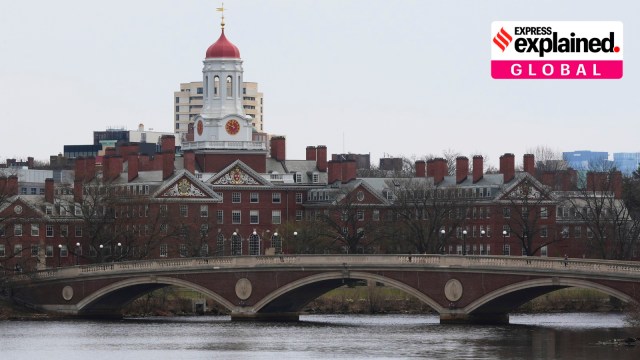A US federal judge on Friday (May 23) temporarily restrained the Donald Trump administration from revoking Harvard University’s ability to enrol international students, a policy imposed on the elite institution the day before.
In its complaint, Harvard called the revocation a “blatant violation” of the Constitution and federal laws, and said the ban would have an “immediate and devastating effect” on the university and its international students. The tussle between the Trump administration and Harvard began after Harvard President Alan M Garber told the administration in April that the university would not accept demands to change its hiring and admissions practices, and its curriculum.


What is SEVP certification, which was revoked for Harvard?
In a letter, dated May 22, the Department of Homeland Security told Harvard that its student and exchange visitor program (SEVP) certification had been revoked, “effective immediately”.
SEVP certification, which is issued by the DHS, allows colleges and universities in the US to enrol international students on F-1, M-1 and J-1 student visas. An F-1 visa is required for international students to attend an academic institution such as a high school or college, while an M-1 visa is for students in vocational or technical training programs at recognised schools. A J-1 visa is needed for exchange program students.
Without SEVP certification, institutions cannot issue Form I-20, which serves as proof of enrollment and is necessary for visitors to maintain student status.
Why was Harvard’s SEVP certification revoked?
The DHS letter accused Harvard of perpetuating an “unsafe” campus environment for Jews, promoting “pro-Hamas sympathies”, and employing “racial” diversity, equity and inclusion policies.
While sharing the letter on X, Homeland Security Secretary Kristi Noem accused the university of also “coordinating with the Chinese Communist Party on its campus”. She wrote, “It is a privilege, not a right, for universities to enrol foreign students… They [Harvard] have lost their SEVP certification as a result of their failure to adhere to the law. Let this serve as a warning to all universities and academic institutions across the country.”
Story continues below this ad
The DHS letter gave Harvard 72 hours to comply with six stringent conditions for its SEVP certification to be restored.
Secretary Noem wrote, “I expect full and complete responses to the following requests:
- Any and all records, whether official or informal, in the possession of Harvard, including electronic records and audio or video footage, regarding illegal activity, whether on or off campus, by a non-immigrant student [those in the US for the temporary purpose of studying] in the last five years.
- Any and all records… regarding dangerous or violent activity… by a non-immigrant student in the last five years.
- Any and all records… regarding threats to other students or university personnel… by a non-immigrant student in the last five years.
- Any and all records… regarding deprivation of rights of other classmates or university personnel… by a non-immigrant student enrolled in the last five years.
- Any and all disciplinary records of all non-immigrant students enrolled in the last five years.
- Any and all audio or video footage… of any protest activity involving a non-immigrant student on a Harvard University campus in the last five years.”

How would this affect Harvard’s foreign students?
The move to block enrollment of overseas students affects 6,793 international students who are currently studying at Harvard. If the restraining order were to be lifted, these students will have to find places to study at other universities in the US or risk having to leave the country.
Story continues below this ad
Typically, F-1 students have 60 days, and J-1 students 30 days, to leave the US after completing their studies. However, if their student status is terminated due to a violation, they may have to leave immediately. In Harvard’s case, it’s unclear how much time international students would be given to transfer or depart.
Some experts, however, suggest that those finishing their programs and due to receive their degrees next week would probably be allowed a grace period by the DHS.
The revocation of the SEVP certification also means that the DHS — responsible for reviewing visa applications — could deny a visa to a student who says they are planning to study at Harvard.

How would this affect Harvard?
International students are a major revenue source for American universities, including Harvard, as they do not receive federal aid and pay higher tuition fees. For instance, most overseas students at Harvard pay full tuition, which is $56,550 for the 2024-25 academic year, either by making direct payments or via scholarships. Housing, food and other mandatory fees amount to an additional $26,316 per student, meaning Harvard makes a sum of $82,866 per year from overseas students.
Story continues below this ad
Exact revenue figures for Harvard are not publicly disclosed, but taking this $82,866 figure into account, the 6,793 international students would be bringing in around $562 million in annual revenue to the university.
In the past four years, the number of overseas students at the university has increased by 26.75%. As of September 2024, international students at Harvard came from 146 countries, with China, Canada and India sending in the largest cohorts, collectively accounting for 40% of the international student population, according to a report by Al Jazeera.
Overseas students also contribute to the US economy. According to the NAFSA Association of International Educators, a non-profit organisation dedicated to international education and exchange, these students contributed approximately $43.8 billion to the US economy during the 2023 – 2024 academic year through tuition and fees, and living expenses.
Why is the Trump administration targeting Harvard?
The Trump administration has targeted not just Harvard but also several other elite universities including Brown University, Cornell University, and Columbia University. This came after President Donald Trump signed an executive order in March on campus free speech — which he deemed a “historic action to defend American students and American values” that have “been under siege” on campuses.
Story continues below this ad
The trigger for the executive order was a protest movement against Israel’s war in Gaza that swept college campuses around the country in 2024. Trump cited the alleged harassment of Jewish students as justification for federal intervention.
However, the Trump administration’s hostility with universities has deeper roots, and is not tied to the conflict in Gaza alone. Conservatives for decades have accused these elite institutes of having a liberal bias, and marginalising right-wing views in lecture halls. They also hold a disdain for the proliferation of diversity, equity and inclusion initiatives on campuses, and see these institutes as incubators of “wokeness”.











































